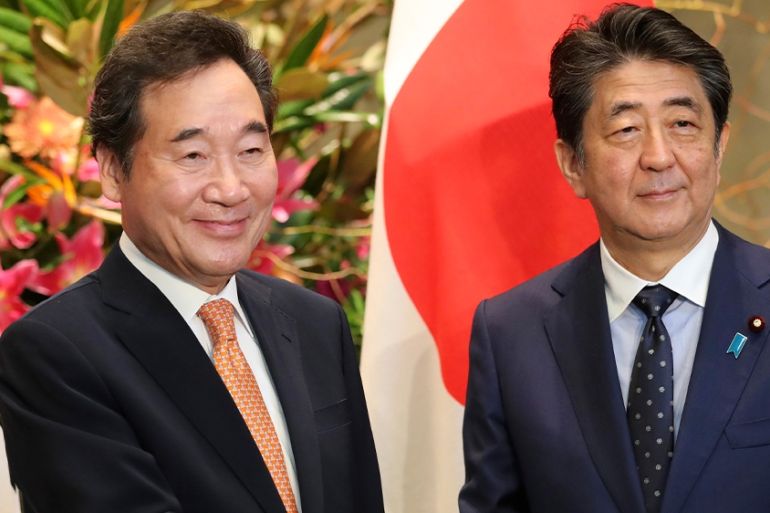Japan and South Korea agree on need to cooperate on North Korea
Shinzo Abe met South Korea’s PM amid deterioration in bilateral relationship that has hurt trade and security ties.

Japanese Prime Minister Shinzo Abe and South Korean Prime Minister Lee Nak-yon agreed on Thursday on the need to cooperate on North Korea despite tense bilateral ties, but Abe reiterated that Seoul needed to keep its promises for relations to improve.
Ties between the two countries have deteriorated since South Korea’s top court last October ordered some Japanese firms to compensate Koreans forced to work in their wartime mines and factories.
Keep reading
list of 4 itemsBoeing hit with 32 whistleblower claims, as dead worker’s case reviewed
US imposes new sanctions on Iran after attack on Israel
A flash flood and a quiet sale highlight India’s Sikkim’s hydro problems
Japan, which says the matter was settled by a 1965 treaty, calls the decision a violation of international law, and the feud has spilled over into trade and security matters.
|
|
About 100 journalists were present at the start of the talks in Tokyo, the highest-level meeting between the two sides since the row began. The meeting began with a handshake.
Abe urged South Korea to keep its promises – a reference to the 1965 treaty – in order to restore relations, according to a statement issued by Japan’s foreign ministry.
“Our two nations are important neighbours for each other, and keeping in contact over North Korea, bilateral relations and our ties with the United States are quite important,” Abe was quoted as telling Lee.
“Relations are currently in quite a severe state but should not be left that way. If South Korea can keep bilateral promises, that could be a chance to return to a healthy relationship,” Abe added.
The statement also quoted Lee as saying he shared the view that dialogue was important, while a parallel statement from South Korea’s foreign ministry said Lee agreed relations should not be left in their current difficult state.
‘Bridge-building’
In a sign of the differences that remain, Lee told Abe that “South Korea has also respected and complied with the 1965 Treaty on Basic Relations and Claims, and will continue to do so,” according to Seoul’s statement.
Yonhap news agency said Lee, who was in Tokyo to attend Japanese Emperor Naruhito’s enthronement ceremony this week, delivered to Abe a personal letter from South Korean President Moon Jae-in in which Moon called for attempts to resolve the pending bilateral issues.
In the letter, he described Japan as a key partner for regional peace, Yonhap said.
Moon and Abe have not held a summit in more than a year and the statements made no mention of any meeting planned between the two.
Reporting from Seoul, Al Jazeera’s Rob McBride described Thursday’s meeting as “bridge-building” and said there were hopes that the two leaders might be able to meet on the sidelines of the coming Asia Pacific Economic Cooperation meeting in Chile.
“There has been an awful lot of spillover (from the dispute),” McBride said. “A lot of people would like to see this resolved.”
The animosity between Japan and South Korea is linked to the history of Japan’s 1910-45 colonisation of the Korean peninsula, the mobilisation of forced labour at companies and women in wartime military brothels, and a row over the control of islets in the sea between the two nations.
Earlier this year, the dispute escalated when Japan tightened export controls on materials vital for South Korean chipmakers. It then dropped Seoul from a list of countries eligible for fast-track exports, steps angrily denounced by South Korea.
In August, South Korea announced it would scrap a military intelligence-sharing pact with Japan when it expires next month, just as the allies face rising tensions over North Korea’s nuclear weapons programme and increased competition from China and Russia.